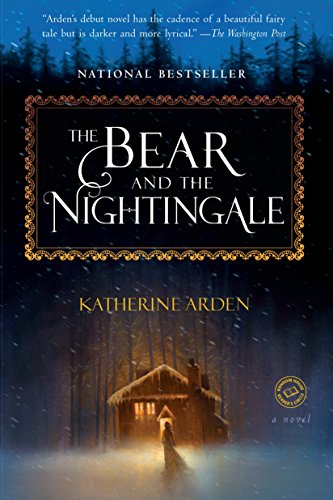 Reading Katherine Arden’s The Bear and the Nightingale—a sumptuous wonderland of magic, faith, and terror set in medieval Northern Russia—was an engrossing experience. Arden’s world is powerfully realized, and reading it was a bit like staring into a snow-globe, and then being able to step in and out at will. I first encountered this book several months ago. I really enjoyed reading it, but for some reason, I only made it 37% of the way through before abandoning it to other interests. But I knew that I wanted to come back, and this week I stepped away from my romance novel reading (the amount of recs I’ve gotten lately has been insane), and returned to the beginning of this jewel of a book. When the book opens, Marina tells her husband that she’s pregnant, and though her husband is worried, she wants to have the baby because she knows that this baby will be just like her mother, who possessed magical abilities. As Marina tells her husband, “power is a birthright to the women of her bloodlines. Olga is your daughter more than mine, but this one…this one will be different.” Marina dies in childbirth, and as she expected, her daughter Vasya can see things, talk to things, and do things, that others cannot. While Vasya’s family members and fellow villagers have faith in the chyerti, supernatural beings that protect their homes and families, they can’t see them or talk to them, as Vasya does. She protects both the chyerti and her fellow humans, often sacrificing her own comfort so that the old ways can continue. And as she learns as the book progresses, it’s desperately important that the chyerti stay strong, because something evil is awakening. Pitched against this supernatural battle is the very real human drama of religion. Vasya knows that abandoning the chyerti will lead to the villagers’ doom, and yet her step-mother, who can see the same things that Vasya can, but who is terrified by them and finds comfort in her maniacal faith, and a new Priest, who feels elevated by the villagers’ love and fear, tell the villagers otherwise. As conditions in the village worsen and it becomes increasingly apparent that Vasya is different than they are, the villagers start to see Vasya as a threat. When the major conflict comes, it's all on the table: the old faith and the new, the supernatural and the human, the dogmatic and the tolerant, and it’s moving and terrifying. This is a rich, decadent, dark chocolate cake of a book, and Vasya is the heroine that we’ve been looking for.
0 Comments
Leave a Reply. |
About me.Give me that HEA, please.
Join my mailing list.Want to receive a weekly email with links to my latest blog posts? Sign up below!
Archives
April 2024
Categories
All
|

 RSS Feed
RSS Feed
